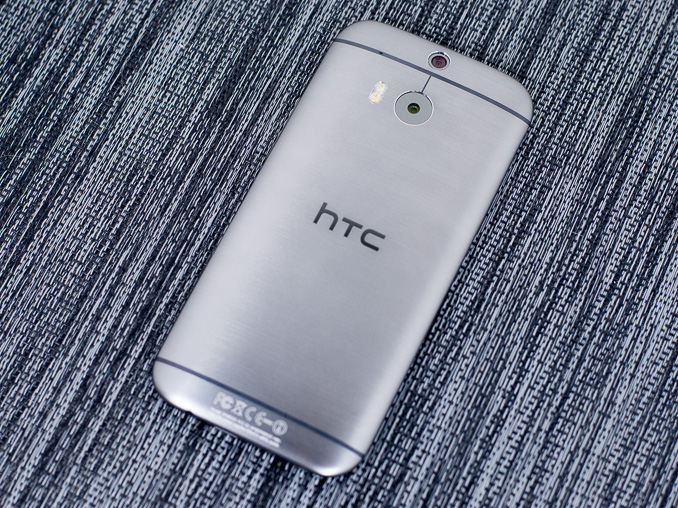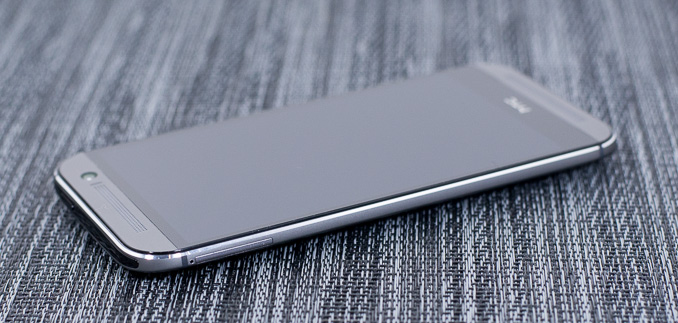The HTC One (M8) Review
by Anand Lal Shimpi & Joshua Ho on March 26, 2014 7:00 PM EST- Posted in
- Smartphones
- HTC
- Mobile
- HTC One
Final Words
Earlier in this review I commented on just how quickly handset OEMs seem to adopt features pioneered by one another. Combine that with the fact that silicon providers like Qualcomm enable a lot of these features across all partners and it’s no surprise that differentiation is becoming an increasingly difficult problem in the smartphone industry. Add to that the trend towards lower cost, lower margin devices making up more of smartphone volume and it becomes very obvious that what HTC is trying to do with the One is incredibly difficult.
There’s good reason that we don’t see many full metal designs in the Android space. It’s a crowded market and when the cost differential between a plastic and full metal chassis approaches an order of magnitude, it’s an easy decision for most. HTC picked the road less traveled with the One last year, and I’m honestly quite glad to see continued commitment to the path with the M8.
While I often praise the Moto X for its wonderful ergonomics, there really is no other Android phone like the One (both old and new) when it comes to feel. The M8’s design is different than its predecessor, but everything I liked about the M7 I find myself liking in its replacement. The device is great to look at, it’s great to hold and it’s built with an eye for design that we just don’t see in a lot among Android OEMs. Including a micro SD card slot is sure to win over some users, and I’m happy to see a move to nano sim as well.
The biggest issue I have with the M8’s design is that it is a little too tall for me. I feel like that was a concession to support the second camera sensor on the back and I’m not sure it was worth it. I will readily admit though that this is very much a personal preference. I remember holding the M7 and thinking it was a bit too big for me, and that was just a year ago. Either my eyesight is getting worse (probably) or I’m beginning to come around to even larger form factors (not quite at the 6-inch range though).
The M8 is more than a pretty face, it’s very well executed on a number of fronts. The underlying hardware is a substantial upgrade compared to the Snapdragon 600 platform in the original One. Battery life is up by as much as 70%. And in areas where battery life doesn’t increase, performance goes up by almost double at effectively no power cost. What was most surprising to me is that even in situations where I ran the CPU or GPU at max performance, the Snapdragon 801 based M8 was able to deliver better battery life or power efficiency compared to the S600 based M7. I shouldn’t really be caught off guard by that given the substantial difference in process, but it just feels rare these days to get these sorts of improvement in a 12 month period.
The RF stack gets a worthwhile upgrade compared to M7 as well. Most SKUs use two components from Qualcomm’s RF360 platform (the envelope tracker and antenna tuner). It’s still to early to get the full RF360 platform in a device, but both of these components play a role in improving power efficiency in connectivity bound scenarios.
Sense 6.0 is a nice improvement over the previous version. Lately I’ve been feeling like the right solution is somewhere between AOSP and these fully custom UIs, but HTC is probably closer than most in getting there. Sense 6.0 is fairly non-intrusive and having a camera UI/app that actually works is definitely worth a departure from stock Android.
HTC’s camera tuning and app remain some of the best executed in the Android space. The new camera UI is even more simplified, without sacrificing flexibility should you need it. The new Auto Max ISO settings are incredibly useful, and honestly solved one of the biggest problems I had with the M7.
The Duo Cam features vary from gimmicky to surprisingly cool. I don’t know that the addition of a second camera sensor is good allocation of BoM (Bill of Materials) resources, particularly if it’s not going to improve image quality. Just like with the M7’s UltraPixel camera however, HTC has its finger on the pulse of where things are headed. With physical limits to what can be done with camera modules in ever shrinking smartphone z-heights, using compute to improve the experience is an obvious next step. In the case of the M8, HTC leverages compute to automate effects processing and not improving IQ, which is the main problem. I feel like there’s an audience for HTC’s Duo Cam effects, but it would be a broader one if the setup improved image quality as well.
There are differences in camera tuning compared to the M7, but by and large captures aren’t really improved. In some cases there’s even a regression thanks to the lack of OIS. Ultimately that’s the biggest problem with the new One. It’s an upgrade in so many areas but it lacks the substantial step forward in primary camera quality that is necessary to move the high end to a better place. I will say that the UltraPixel camera can still produce some amazing photos. Particularly for web use and sharing the way we do, I’m still very pleased with what comes out of the One. It’s an extremely versatile shooter, I just wish it improved as much as the rest of the platform did this generation.
I ran into someone last week who was on the verge of purchasing an M7. I told him all about the different options on the market, including those about to be on the market, and he responded by saying that it didn’t matter. Material feel and quality both mattered more to him than anything else, and for someone in that boat, HTC is virtually peerless in the Android space. I don’t know how big of a market that is, and thankfully the M8 delivers more than just design. It’s a very well executed phone, and as I mentioned earlier - if you liked the M7, you’ll be very happy with the M8. The question is whether or not that’s good enough. I feel like HTC has the makings of a real success story, but it needs slightly broader appeal. HTC has the right formula, which is the hard part - it just needs a little tweaking.












222 Comments
View All Comments
ShieTar - Thursday, March 27, 2014 - link
I think if you compare a 2MP and a 8+MP picture by looking at it on a 2MP-5" screen, about 100% of the people will not be able to tell which one has the better resolution.But I agree with your general comment, people complaining endlessly about the photographing qualities of a device that can't be connected to a good objective anyways is just weird.
Braumin - Thursday, March 27, 2014 - link
Sorry I don't agree with you. 4MP is lots for twitter and facebook, but you can't crop the image at all. Plus 4MP doesn't allow 4k recording.Also they took out the OIS. The camera is fine in the One, but it's a regression from last year's model. That's why it's getting knocked. People had issues with the camera last year, and now they've actually gone back a step rather than address the issues.
Don't forget you're not talking about a Lumia 520 here, or even a Moto X. This is a full flagship phone, with the price to match. They needed to put a larger physical sensor in this year. If they had done 6-8 MP with the "ultrapixels" that would be one of the best camera's on a phone. Instead they regressed. That's never what you want to see in a flagship and they've been rightfully called out on it.
darkich - Thursday, March 27, 2014 - link
Don't you ever, like, zoom in the photos?For, you know, seeing the finer detail?
sevenmack - Thursday, March 27, 2014 - link
Depends. While I do a lot of cropping of my photos, I usually use Photoshop for that purpose. Does the job better than most mobile apps (including those that come with the phone itself). But for the average person, cropping is a rare event. In fact, you would be lucky to talk to someone who regularly crops smartphone camera photos for detail purposes.So Jonup does have a point. Doesn't mean that the M8 suits your needs; to each their own on that one. But for most folks -- including many professional photographers such as Mahmoud Mfinanga of EmmazedPhotog.com, and Colby Brown -- the M8 (and the M7 before it) more than does the job.
Scootiep7 - Friday, March 28, 2014 - link
You do realize that most of the actual, professional photography work that Mahmoud Mfinanga and Colby Brown do uses either film or high end DSLR's cameras right? I mean it's literally on their websites. And no, the M8 and M7 would not cut it for them.doosh bag - Friday, March 28, 2014 - link
They didn't say they used the phone camera, they simply endorsed it. Have it a thumbs up, if you will.CoryWeston101 - Monday, March 31, 2014 - link
I know a few that would disagree. And believe the M8 and M7 have great camera's for smartphones.sephirotic - Sunday, March 30, 2014 - link
Finer detail, on 16mpx 1/3" sensor? Good joke, sir.CoryWeston101 - Monday, March 31, 2014 - link
No. That's stupid.jond11 - Thursday, March 27, 2014 - link
Maybe you should do better research. The camera improved from last year's model even with them removing ois. Not one tech site yet said picture quality is worse on the M8 compared to the M7. Actually, anyone who reviews the 2 phones all agree it takes better pictures. It's funny how the HTC ONE 2014 performed better than any phone on the plantet, but it wasn't worthy because it had a 4 ultra pixel camera. Yet the Note2, Note3, and S4 don't perform half as smoothly as the ONE and was considered great phones. So Iguess iit's ok now to make flagship phones buggy and filled with lag as long as it carries a 8 megapixel camera or better, lol.